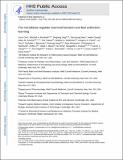The microbiota regulate neuronal function and fear extinction learning
Author(s)
Chu, Coco; Murdock, Mitchell H.; Jing, Deqiang; Won, Tae Hyung; Chung, Hattie; Kressel, Adam M.; Tsaava, Tea; Addorisio, Meghan E.; Putzel, Gregory G.; Zhou, Lei; Bessman, Nicholas J.; Yang, Ruirong; Moriyama, Saya; Parkhurst, Christopher N.; Li, Anfei; Meyer, Heidi C.; Teng, Fei; Chavan, Sangeeta S.; Tracey, Kevin J.; Regev, Aviv; Schroeder, Frank C.; Lee, Francis S.; Liston, Conor; Artis, David; ... Show more Show less
DownloadAccepted version (4.657Mb)
Publisher Policy
Publisher Policy
Article is made available in accordance with the publisher's policy and may be subject to US copyright law. Please refer to the publisher's site for terms of use.
Terms of use
Metadata
Show full item recordAbstract
Multicellular organisms have co-evolved with complex consortia of viruses, bacteria, fungi and parasites, collectively referred to as the microbiota1. In mammals, changes in the composition of the microbiota can influence many physiologic processes (including development, metabolism and immune cell function) and are associated with susceptibility to multiple diseases2. Alterations in the microbiota can also modulate host behaviours—such as social activity, stress, and anxiety-related responses—that are linked to diverse neuropsychiatric disorders3. However, the mechanisms by which the microbiota influence neuronal activity and host behaviour remain poorly defined. Here we show that manipulation of the microbiota in antibiotic-treated or germ-free adult mice results in significant deficits in fear extinction learning. Single-nucleus RNA sequencing of the medial prefrontal cortex of the brain revealed significant alterations in gene expression in excitatory neurons, glia and other cell types. Transcranial two-photon imaging showed that deficits in extinction learning after manipulation of the microbiota in adult mice were associated with defective learning-related remodelling of postsynaptic dendritic spines and reduced activity in cue-encoding neurons in the medial prefrontal cortex. In addition, selective re-establishment of the microbiota revealed a limited neonatal developmental window in which microbiota-derived signals can restore normal extinction learning in adulthood. Finally, unbiased metabolomic analysis identified four metabolites that were significantly downregulated in germ-free mice and have been reported to be related to neuropsychiatric disorders in humans and mouse models, suggesting that microbiota-derived compounds may directly affect brain function and behaviour. Together, these data indicate that fear extinction learning requires microbiota-derived signals both during early postnatal neurodevelopment and in adult mice, with implications for our understanding of how diet, infection, and lifestyle influence brain health and subsequent susceptibility to neuropsychiatric disorders.
Date issued
2019-10Department
Massachusetts Institute of Technology. Department of Biology; Koch Institute for Integrative Cancer Research at MITJournal
Nature
Publisher
Springer Science and Business Media LLC
Citation
Chu, Coco et al. "The microbiota regulate neuronal function and fear extinction learning." Nature 574, 7779 (October 2019): 543–548 © 2019 The Author(s)
Version: Author's final manuscript
ISSN
0028-0836
1476-4687